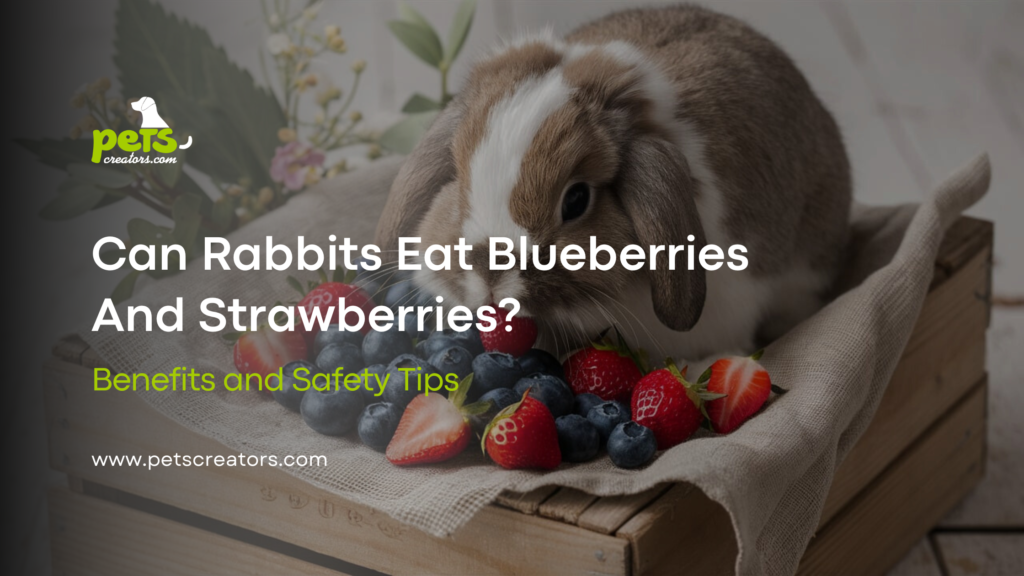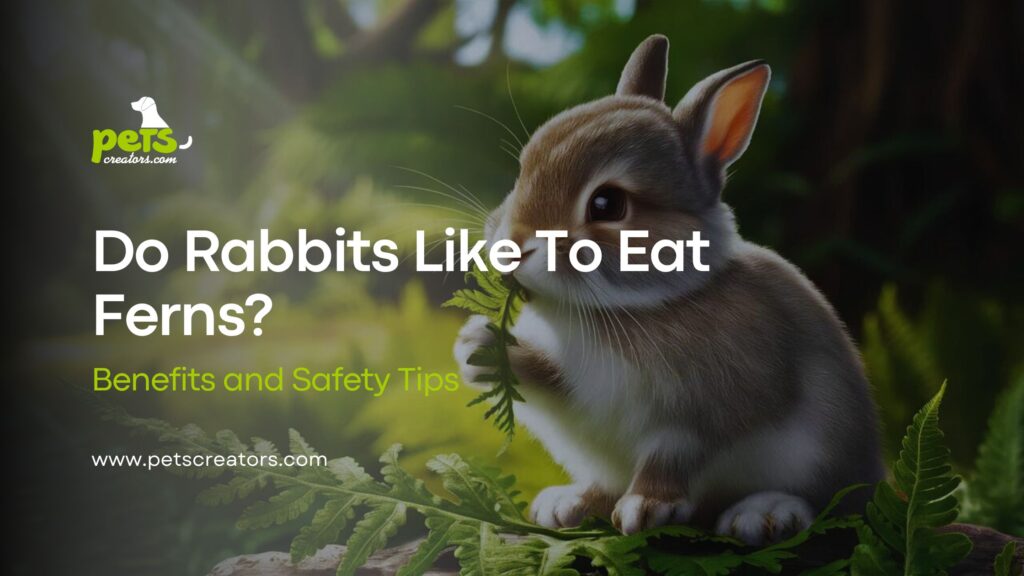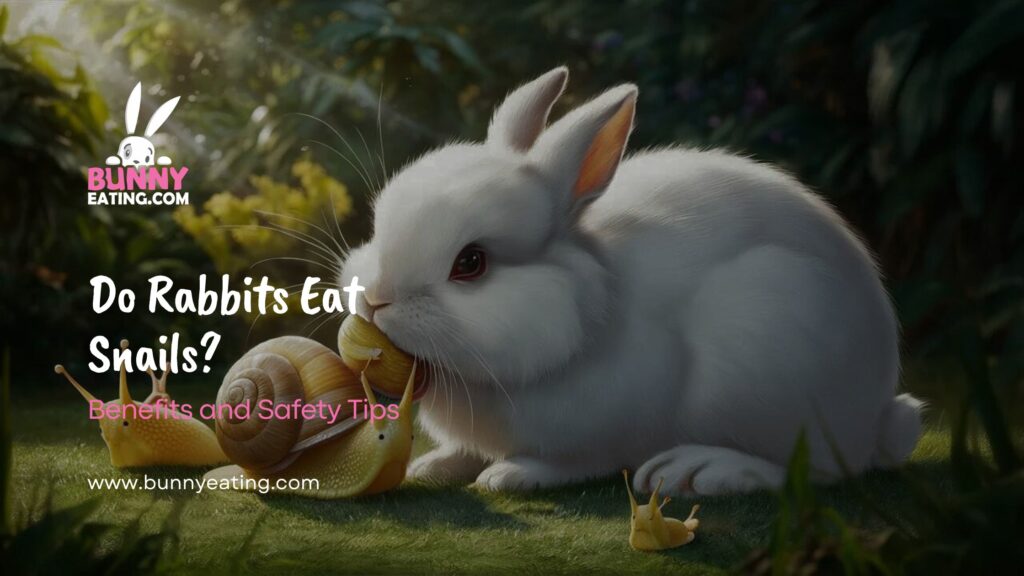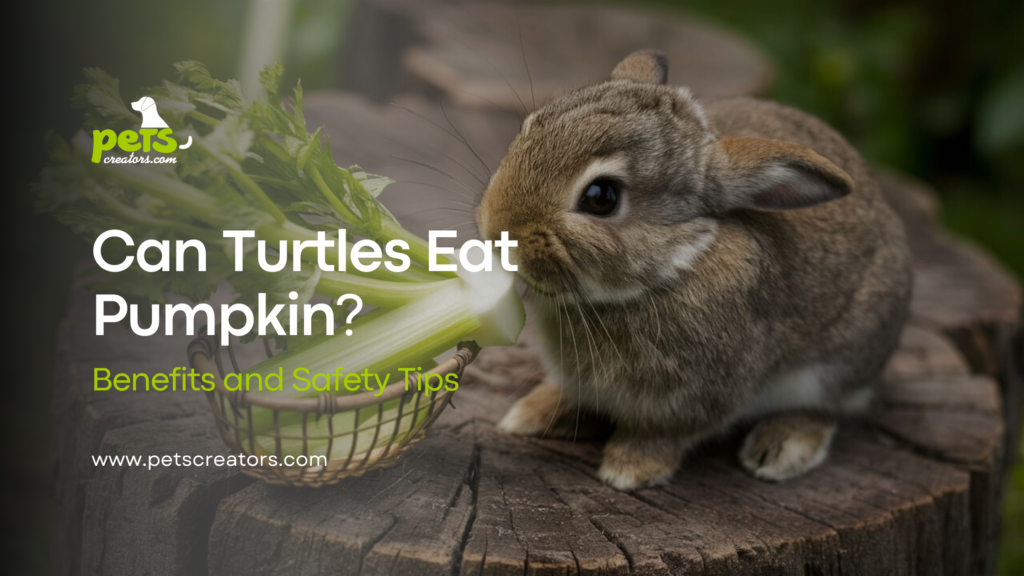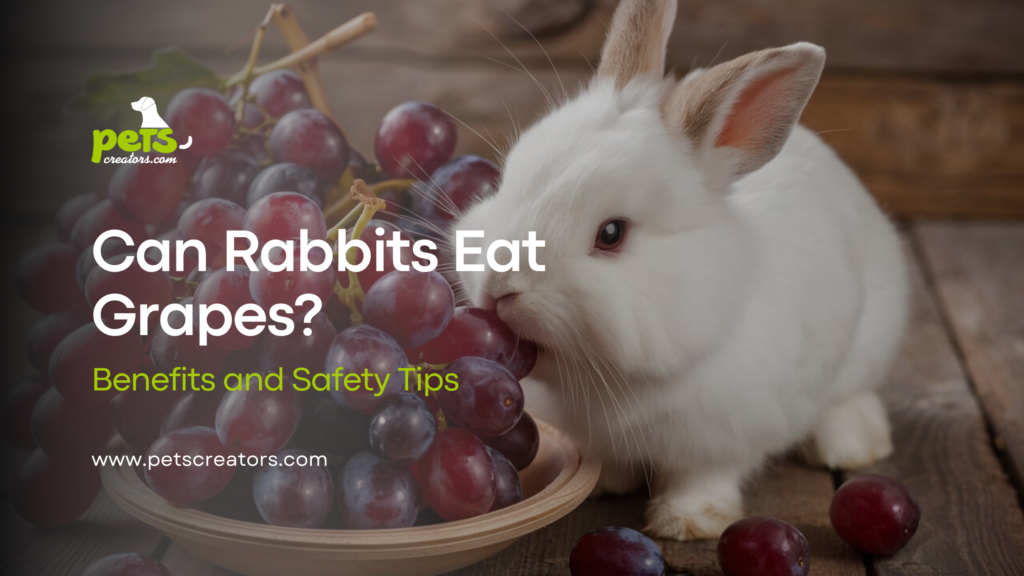Curious to know if rabbits are allowed to consume blueberries and strawberries? These fruits can be wonderful snacks, but it is important to learn how they may affect the well-being of your pet. In this article, we are going to take our time and discuss all aspects of feeding rabbits with blueberries and strawberries. We will include potential risk factors and issues related to nutrition, feeding schedules, and homemade recipes for pets. If you have questions about how these fruits impact their digestion or the correct methods to reintroduce them, this guide will give you definite answers. Now, let us make sure that your rabbit eating these treats safely and happily!
Safe Alternative to Rabbits Eating Blueberries and Strawberries?
A diet of rabbits includes fresh leaves, and vegetables from the garden, however, fruits like blueberries and strawberries? Although these fruits may well be lovely to give your bunny, here are some other safe ones you might wish to consider. For instance, carrots, bell peppers, and kale, spinach, are equally as nutritious as fruits but do not necessarily offer the same shock of sugar as do fruits. Having your rabbit eat herbs such as parsley and cilantro also comes in handy when it comes to mixing its diet. It is advisable to introduce the food slowly to avoid complicating the situation by introducing a new allergen if your child is allergic. Can Rabbits Eat Blueberries And Strawberries?
Risks of Feeding Blueberries and Strawberries to Rabbits
Although blueberries and strawberries are packed with vitamins and antioxidants, they also contain a significant amount of sugar. Feeding these fruits to your rabbit in large quantities can lead to obesity and other health issues like gastrointestinal stasis. Additionally, because rabbits have sensitive digestive systems, an overload of sugar can disrupt their gut flora, leading to digestive problems. Always feed fruits sparingly and in moderation to avoid these risks.
Effects of Blueberries and Strawberries on Rabbits
It’s good and bad to give your rabbit blueberries and strawberries to feed him/ her. On the positive side, these fruits have vitamins, particularly vitamin C and antioxidants that help to strengthen the rabbit immune system. However, their sugary nature means that if taken frequently or in large quantities, they cause weight gain and some digestive complications. As much as the rabbit enjoys these treats, it is wise to offer them while supplementing other meals to enhance their health and well-being.
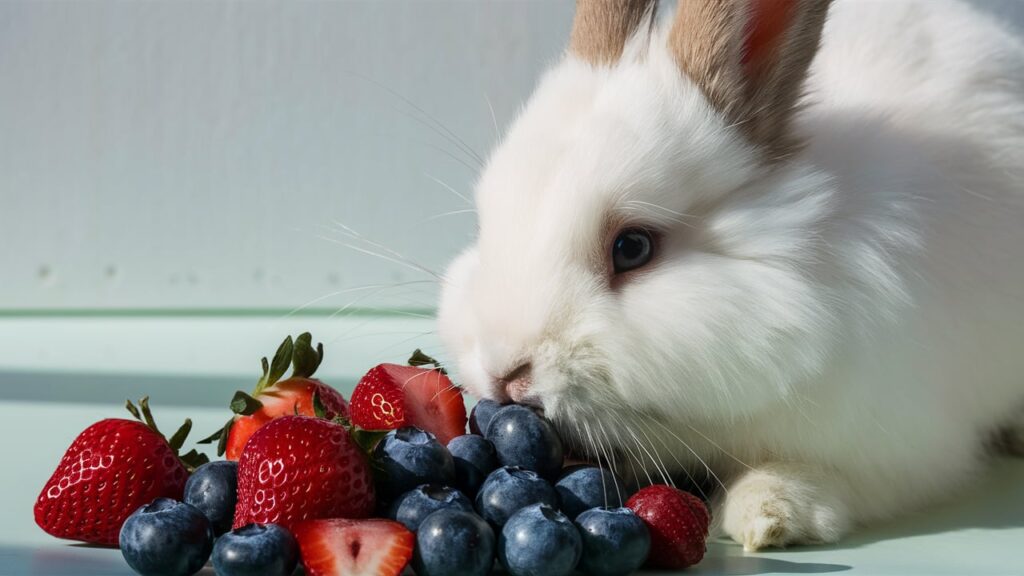
Are Blueberries and Strawberries Good for Rabbits?
In moderation, blueberries and strawberries can be a healthy addition to your rabbit’s diet. They offer various vitamins and antioxidants that are beneficial for overall health. However, because they are high in sugar, they should only be given occasionally and in small amounts. Always wash the fruits thoroughly to remove any pesticides or chemicals before offering them to your rabbit.
Nutritional Value of Blueberries and Strawberries for Rabbits
Blueberries and strawberries are rich in vitamins and minerals, including vitamin C, vitamin K, and fibre. They also contain antioxidants that help fight free radicals in the body. While these nutrients are beneficial, it’s essential to remember that the high sugar content means these fruits should be given as an occasional treat rather than a staple in your rabbit’s diet.
How Are Blueberries and Strawberries Made?
Blueberries and strawberries are typically grown on farms or in gardens. They require specific conditions to thrive, including adequate sunlight, water, and soil nutrients. Blueberries grow on bushes, while strawberries grow on plants that spread out along the ground. Both fruits are harvested when ripe and can be found fresh in grocery stores or farmers’ markets.
What Types of Blueberries and Strawberries Are Safe for Rabbits?
When it comes to feeding your rabbit blueberries and strawberries, opt for organic varieties whenever possible. Organic fruits are grown without synthetic pesticides or fertilizers, making them a safer choice for your pet. Avoid giving your rabbit fruits that are canned, dried, or preserved with added sugars or chemicals.
Do Wild Rabbits Eat Blueberries and Strawberries?
In the wild, rabbits primarily consume grasses, herbs, and other vegetation. However, they may occasionally nibble on berries if they come across them. Wild rabbits’ diets are varied and depend largely on what is available in their environment. While they might eat berries in small amounts, their primary diet consists of fibrous plants that are more suited to their digestive systems.
Why Is Eating Blueberries and Strawberries Harmful to Rabbits?
Blueberries and strawberries are not inherently harmful to rabbits but can become problematic if fed in large quantities. The high sugar content can upset their delicate digestive balance, leading to health issues like obesity and digestive problems. It’s crucial to monitor the amount of fruit your rabbit consumes to prevent any adverse effects.
Store-bought blueberries and Strawberries Rabbits
When buying blueberries and strawberries for your rabbit, it’s best to choose organic produce to avoid pesticides and chemicals. Wash the fruits thoroughly before serving to remove any potential residues. Avoid any pre-packaged fruits that contain added sugars or preservatives, as these can be harmful to your rabbit’s health.
How Often Can My Rabbit Eat Blueberries and Strawberries?
Blueberries and strawberries should be given as an occasional treat rather than a regular part of your rabbit’s diet. A small serving once or twice a week is sufficient. This helps prevent any potential health issues related to high sugar intake and ensures that your rabbit gets a balanced diet.
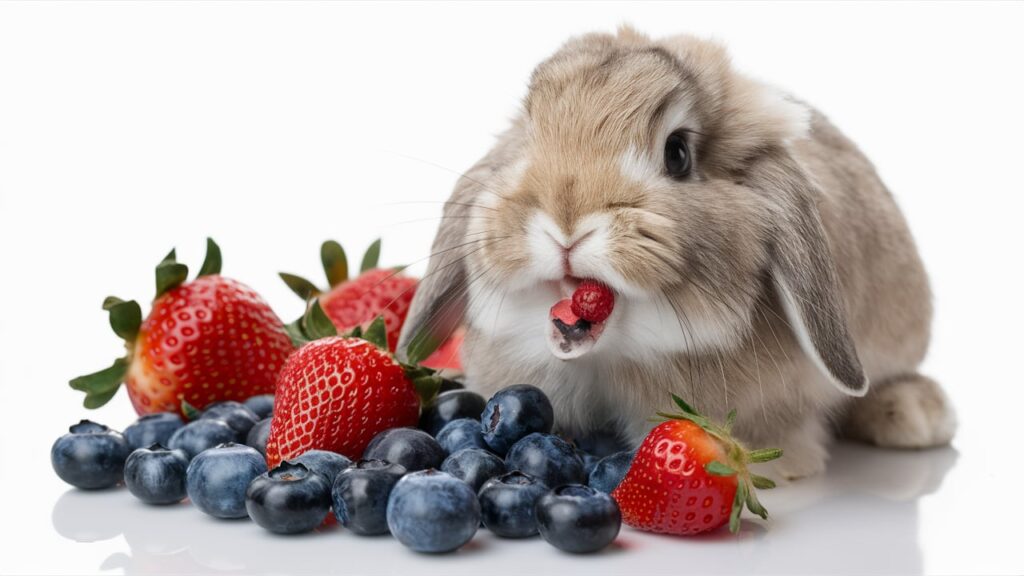
How Many Blueberries and Strawberries Are There?
There are many varieties of blueberries and strawberries, each with its unique flavour and nutritional profile. Common types of blueberries include highbush, lowbush, and rabbiteye, while strawberries come in varieties like June-bearing, everbearing, and day-neutral. Each type has its own growing requirements and taste characteristics.
Observing Your Rabbit After Eating Blueberries and Strawberries
After feeding your rabbit blueberries or strawberries, monitor them for any signs of digestive upset or unusual behaviour. Look for symptoms like changes in stool consistency, lethargy, or lack of appetite. If you notice any adverse reactions, discontinue feeding the fruits and consult your veterinarian.
What About Blueberries and Strawberries Seeds and Leaves?
While the flesh of blueberries and strawberries is safe for rabbits, the seeds and leaves can pose a risk. Strawberry leaves contain tannins, which can cause stomach upset, and while blueberry seeds are generally small and not harmful in tiny amounts, it’s best to remove any large seeds to prevent choking hazards.
Tips for Serving Blueberries and Strawberries to Bunnies
When serving blueberries and strawberries to your rabbit, wash the fruits thoroughly to remove any pesticides. Cut strawberries into small pieces to prevent choking, and serve blueberries whole if they are small. Always start with a small amount to see how your rabbit reacts before offering more.
How Do Blueberries and Strawberries Digest in Rabbits?
Rabbits have a unique digestive system that relies heavily on fibre from hay and greens. While they can digest small amounts of fruit, too much can disrupt their gut flora and lead to digestive problems. It’s important to feed fruits in moderation and balance them with high-fibre foods to support healthy digestion.
What Are the Nutritional Benefits of Eating Blueberries and Strawberries for Rabbits?
Blueberries and strawberries offer several nutritional benefits for rabbits, including vitamins C and K, antioxidants, and fibre. These nutrients support immune function, help combat oxidative stress, and contribute to overall health. However, because of the sugar content, these fruits should be fed sparingly.

Do Rabbits Enjoy Blueberries and Strawberries?
Most rabbits enjoy the sweet taste of blueberries and strawberries, making them a popular treat. Their natural sweetness and juicy texture are appealing to bunnies, who often get excited when they see these fruits. However, every rabbit is different, and some may prefer other types of treats.
What Parts of Blueberries and Strawberries Can Rabbits Eat?
Rabbits can eat the flesh of blueberries and strawberries but should avoid the leaves and large seeds. The fruits should be washed and prepared properly to ensure they are safe for consumption. Small, manageable pieces help prevent choking and make it easier for rabbits to eat.
Can Rabbits Eat Blueberries and Strawberries Seeds?
While blueberry seeds are generally small and safe in tiny amounts, it’s best to avoid feeding them to your rabbit. Strawberry seeds, which are on the outer part of the fruit, are usually fine in small quantities. However, it’s important to monitor your rabbit for any signs of digestive upset when introducing new foods.
Can Blueberries and Strawberries Be Toxic to Rabbits?
Blueberries and strawberries themselves are not toxic to rabbits, but the leaves and stems can be harmful due to the presence of certain compounds. Always ensure that you only feed the fruit part and avoid any other parts of the plant to prevent potential toxicity.
Can Blueberries and Strawberries Cause Digestive Problems in Rabbits?
Yes, if fed in large quantities, the high sugar content in blueberries and strawberries can cause digestive problems in rabbits. Symptoms may include soft stools, changes in eating habits, or lethargy. It’s important to feed these fruits in moderation to prevent such issues.
How Do You Introduce Your Bunny to Blueberries and Strawberries?
Introduce blueberries and strawberries to your rabbit slowly. Start with a small piece and observe for any adverse reactions over 24 hours. If your rabbit handles the new treat well, you can gradually increase the amount, always keeping it to an occasional treat rather than a regular part of their diet.
Preparing Blueberries and Strawberries for Rabbits
Wash the fruits thoroughly to remove any pesticides or chemicals. Cut strawberries into small, bite-sized pieces and serve blueberries whole if they are small. Ensure the fruits are fresh and free from mould or spoilage before offering them to your rabbit.
How Do Rabbits Eat Blueberries and Strawberries?
Rabbits typically nibble on small pieces of blueberries and strawberries, enjoying the sweet taste and juicy texture. They use their front teeth to bite into the fruit and then chew it with their back teeth. Always supervise your rabbit while eating to ensure they don’t choke on larger pieces.
What Happens If Rabbits Eat Too Much Blueberries and Strawberries?
If rabbits eat too many blueberries and strawberries, they may experience digestive problems due to the high sugar content. Symptoms can include soft stools, lack of appetite, and lethargy. It’s crucial to limit the amount of fruit in your rabbit’s diet to prevent these issues.
What If My Rabbit Eats a Large Amount of Blueberries and Strawberries?
If your rabbit accidentally consumes a large amount of blueberries and strawberries, monitor them closely for any signs of distress. Provide plenty of hay and water to help balance their digestive system. If you notice any severe symptoms or changes in behaviour, contact your veterinarian for advice.
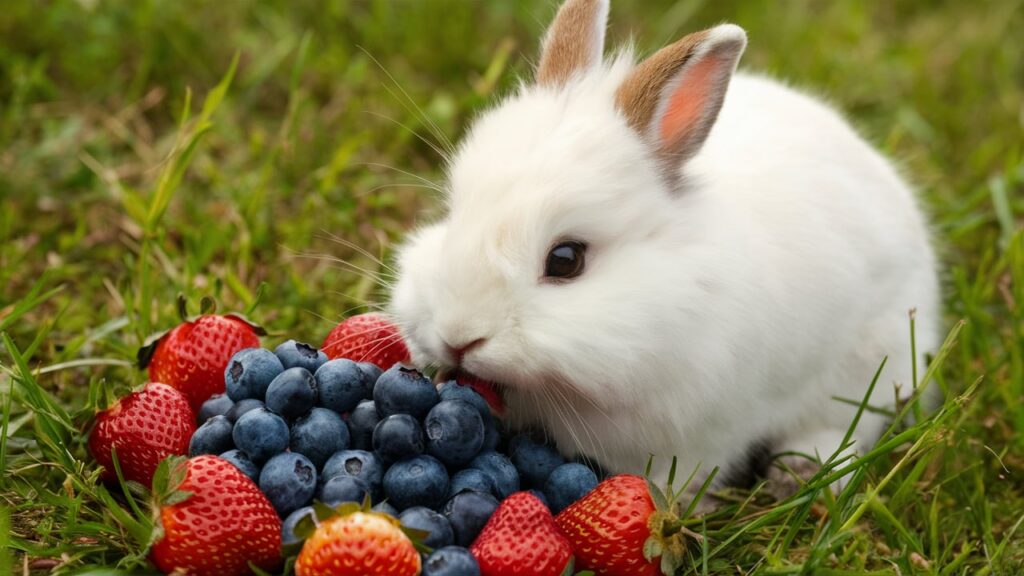
How Many Blueberries and Strawberries Can My Rabbit Have?
A general guideline is to offer no more than one or two small pieces of fruit per week. This ensures your rabbit enjoys a variety of treats without risking their health. Adjust the portion size based on your rabbit’s size and overall diet. Always prioritize hay and fresh greens as the main components of their daily meals.
When Shouldn’t You Feed Blueberries and Strawberries to Your Rabbit?
If the rabbit has delicate digestion or it is chubby, it is recommended to refrain from feeding it blueberries and strawberries. These fruits should also not be given to your rabbit if it has any of the following diseases; Diabetes or any other health condition that needs a strict diet. So, before adding new products to your rabbit’s diet, it is recommended to consult with the veterinarian to check whether it is suitable for the rabbit with your particular type of health issues.
Can Baby Rabbits Eat Blueberries and Strawberries?
It’s best to wait until baby rabbits (kits) are at least 12 weeks old before introducing fruits like blueberries and strawberries. Their digestive systems are still developing, and introducing new foods too early can lead to digestive upset. Start with small amounts and monitor their reaction closely before offering more.
How Frequently Should Adult and Baby Rabbits Be Fed Blueberries and Strawberries?
Adult rabbits can enjoy blueberries and strawberries as an occasional treat, ideally no more than once or twice a week. Baby rabbits should have these fruits sparingly and only after they have been weaned onto solid foods and their digestive systems are more mature. Always prioritize hay and fresh greens as the main components of their diet.
Potential Dangers in Blueberries and Strawberries
The main danger in feeding blueberries and strawberries to rabbits lies in their high sugar content. Overconsumption can lead to obesity, dental problems, and digestive issues like diarrhoea or gastrointestinal stasis. Always feed these fruits in moderation and monitor your rabbit for any adverse reactions.
What If My Rabbit Accidentally Eats a Lot of Blueberries and Strawberries?
If your rabbit accidentally eats a large amount of blueberries and strawberries, observe them closely for any signs of discomfort or digestive upset. Provide unlimited access to fresh hay and water to help flush out their system and restore balance. Contact your veterinarian if you notice any severe symptoms or changes in behaviour.
Monitoring Your Rabbit’s Health with Blueberries and Strawberries
After feeding blueberries and strawberries to your rabbit, monitor their health closely. Watch for changes in appetite, stool consistency, and overall behaviour. If your rabbit shows any signs of distress or discomfort, discontinue feeding the fruits and consult with your veterinarian promptly.
Incorporating Fresh Greens and Vegetables
To maintain a balanced diet for your rabbit, incorporate a variety of fresh greens and vegetables alongside occasional treats like blueberries and strawberries. Leafy greens such as romaine lettuce, parsley, and cilantro are excellent choices. Vegetables like carrots, bell peppers, and broccoli can provide additional nutrients and variety.
What Actions Should I Take If My Rabbit Consumes Blueberries and Strawberries?
If your rabbit consumes blueberries and strawberries, take proactive steps to ensure their health. Provide plenty of fresh hay and water to aid digestion and prevent any potential issues from arising. Monitor their behaviour and consult your veterinarian if you have any concerns.
Creating a Balanced Diet with Blueberries and Strawberries
Blueberries and strawberries can be part of a balanced diet for your rabbit when offered in moderation. Ensure that the majority of their diet consists of hay and fresh greens, with fruits like these being occasional treats. This helps maintain their overall health and prevents diet-related health problems.

My Rabbit Ate a Whole Blueberry or Strawberry?
If your rabbit eats a whole blueberry or strawberry, monitor them closely for any signs of choking or discomfort. Most rabbits can handle small fruits like these without issue, but it’s essential to watch them carefully, especially if the fruit is larger than usual. If you notice any difficulties or concerns, contact your veterinarian.
Can Rabbits Eat Wild Blueberries and Strawberries?
Wild blueberries and strawberries are generally safe for rabbits to eat if they are collected from a clean, pesticide-free environment. However, always wash wild fruits thoroughly before offering them to your rabbit to remove any potential contaminants. Limit wild fruits as treats and prioritize those grown in controlled environments.
What Else Can I Feed My Rabbit Besides Blueberries and Strawberries?
Besides blueberries and strawberries, rabbits can enjoy a variety of fresh vegetables, herbs, and occasional fruits. Leafy greens like kale, spinach, and dandelion greens are excellent sources of nutrients. Vegetables such as carrots, celery, and bell peppers provide additional variety. Always introduce new foods gradually to monitor your rabbit’s reaction.
How to Create a Rabbit-Friendly Garden?
Creating a rabbit-friendly garden involves planting a variety of safe herbs and vegetables that your rabbit can enjoy. Avoid toxic plants and prioritize those that are rabbit-safe, such as parsley, cilantro, and leafy greens. Provide a secure enclosure to prevent rabbits from accessing plants that may be harmful to them.
Blueberries and Strawberries Feeding Guidelines and Amounts?
Follow these feeding guidelines to ensure your rabbit enjoys blueberries and strawberries safely:
- Offer small amounts (one or two berries) once or twice a week.
- Wash fruits thoroughly and remove any stems or leaves.
- Monitor your rabbit for any signs of digestive upset or discomfort.
- Always prioritize hay and fresh greens as the main components of their diet.
Rabbit Treats Made at Home with Blueberries and Strawberries?
You can create homemade rabbit treats using blueberries and strawberries by incorporating them into recipes with other rabbit-safe ingredients. For example, blend them with oats and a small amount of plain yoghurt, then freeze them into small portions for a refreshing treat. Always ensure that any homemade treats are free from added sugars or harmful additives.
Conclusion
Lastly, it can be said that both blueberries and strawberries, though containing some beneficial nutrients, could be a good supplement to your rabbit’s diet, however, use them in proper amounts only. Such fruits should only be offered in small amounts occasionally while providing kiwi’s necessary nutrition from a balanced diet of hays and fresh greens. Appropriate care of your rabbit and the right feeding pattern will help control all aspects of sugar thus avoiding other problems that might be linked to it. With this being said, you should be ready to keep your pet rabbit joyful and healthy, at the same time making sure that your little companion will not get sick from the sweets.
FAQs
Q Are blueberries and strawberries safe for rabbits to eat?
Yes, in moderation. These fruits can be given as occasional treats.
Q What are the risks of feeding blueberries and strawberries to rabbits?
Overconsumption can lead to digestive issues and obesity due to their high sugar content.
Q How often can rabbits eat blueberries and strawberries?
Ideally, once or twice a week as a treat.
Q Can baby rabbits eat blueberries and strawberries?
It’s best to wait until they are at least 12 weeks old and their digestive systems are more mature.
Q: What should I do if my rabbit eats too many blueberries or strawberries?
Monitor for signs of discomfort and provide plenty of hay and water to help balance their system.
Q Can rabbits eat wild blueberries and strawberries?
Yes, if they are from a clean, pesticide-free environment and washed thoroughly.
Q How should I introduce blueberries and strawberries to my rabbit?
Start with a small amount and monitor for any adverse reactions before offering more.
Q What other foods can I feed my rabbit besides blueberries and strawberries?
Fresh greens, vegetables like carrots and bell peppers, and rabbit-safe herbs are excellent choices.
Q Should I feed blueberry or strawberry leaves and seeds to my rabbit?
No, these parts can be harmful to rabbits. Stick to the flesh of the fruits only.
Q Why is moderation important when feeding fruits to rabbits?
It helps prevent digestive upset and ensures a balanced diet centred around hay and greens.

